
Question Number 204647 by Engr_Jidda last updated on 24/Feb/24
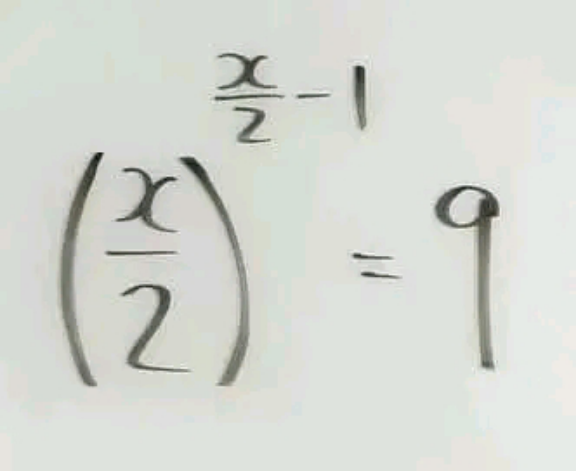
Answered by Rasheed.Sindhi last updated on 24/Feb/24

$$\left(\frac{{x}}{\mathrm{2}}\right)^{\frac{{x}}{\mathrm{2}}−\mathrm{1}} =\mathrm{3}^{\mathrm{2}} \\ $$$$\Leftarrow\frac{{x}}{\mathrm{2}}=\mathrm{3}\:\wedge\:\frac{{x}}{\mathrm{2}}−\mathrm{1}=\mathrm{2}\Rightarrow{x}=\mathrm{6} \\ $$
Commented by Engr_Jidda last updated on 24/Feb/24

$${thanks} \\ $$
Answered by Rasheed.Sindhi last updated on 24/Feb/24
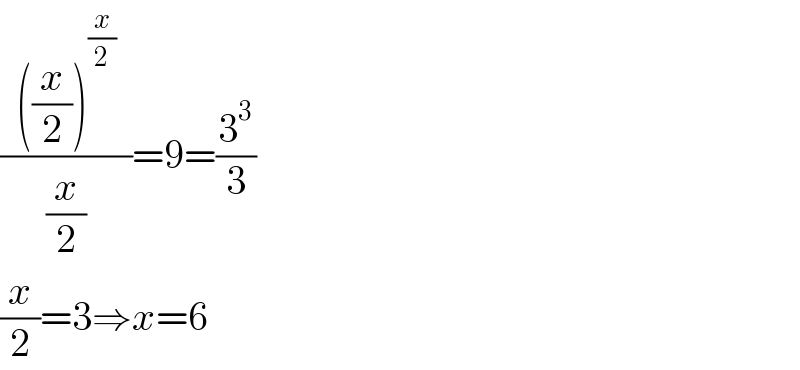
$$\frac{\:\:\left(\frac{{x}}{\mathrm{2}}\right)^{\frac{{x}}{\mathrm{2}}} \:\:}{\frac{{x}}{\mathrm{2}}}=\mathrm{9}=\frac{\mathrm{3}^{\mathrm{3}} }{\mathrm{3}} \\ $$$$\frac{{x}}{\mathrm{2}}=\mathrm{3}\Rightarrow{x}=\mathrm{6} \\ $$
Commented by Frix last updated on 24/Feb/24

$$\mathrm{There}'\mathrm{s}\:\mathrm{a}\:\mathrm{2}^{\mathrm{nd}} \:\mathrm{solution}\:\mathrm{we}\:\mathrm{can}\:\mathrm{only} \\ $$$$\mathrm{approximste}: \\ $$$${x}\approx.\mathrm{179044868} \\ $$
Commented by Frix last updated on 24/Feb/24
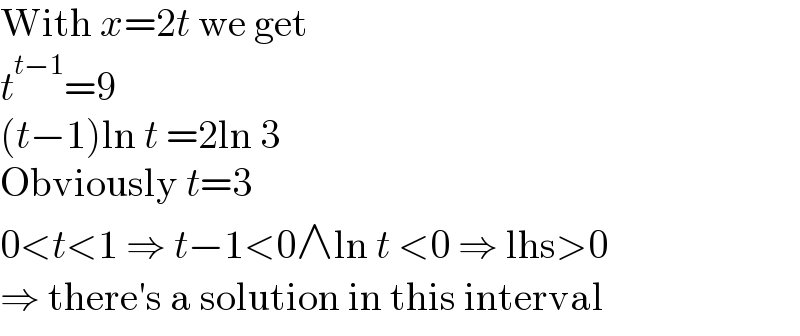
$$\mathrm{With}\:{x}=\mathrm{2}{t}\:\mathrm{we}\:\mathrm{get} \\ $$$${t}^{{t}−\mathrm{1}} =\mathrm{9} \\ $$$$\left({t}−\mathrm{1}\right)\mathrm{ln}\:{t}\:=\mathrm{2ln}\:\mathrm{3} \\ $$$$\mathrm{Obviously}\:{t}=\mathrm{3} \\ $$$$\mathrm{0}<{t}<\mathrm{1}\:\Rightarrow\:{t}−\mathrm{1}<\mathrm{0}\wedge\mathrm{ln}\:{t}\:<\mathrm{0}\:\Rightarrow\:\mathrm{lhs}>\mathrm{0} \\ $$$$\Rightarrow\:\mathrm{there}'\mathrm{s}\:\mathrm{a}\:\mathrm{solution}\:\mathrm{in}\:\mathrm{this}\:\mathrm{interval} \\ $$
Answered by bello6646 last updated on 24/Feb/24
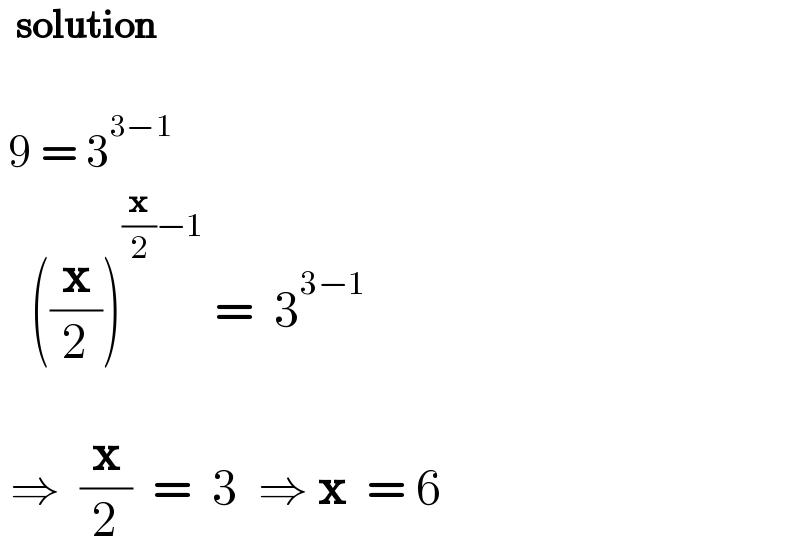
$$\:\:\boldsymbol{\mathrm{solution}} \\ $$$$ \\ $$$$\:\mathrm{9}\:=\:\mathrm{3}^{\mathrm{3}−\mathrm{1}} \\ $$$$\:\:\:\left(\frac{\boldsymbol{\mathrm{x}}}{\mathrm{2}}\right)^{\frac{\boldsymbol{\mathrm{x}}}{\mathrm{2}}−\mathrm{1}} \:=\:\:\mathrm{3}^{\mathrm{3}−\mathrm{1}} \\ $$$$\:\:\: \\ $$$$\:\Rightarrow\:\:\frac{\boldsymbol{\mathrm{x}}}{\mathrm{2}}\:\:=\:\:\mathrm{3}\:\:\Rightarrow\:\boldsymbol{\mathrm{x}}\:\:=\:\mathrm{6} \\ $$
Answered by lepuissantcedricjunior last updated on 26/Feb/24
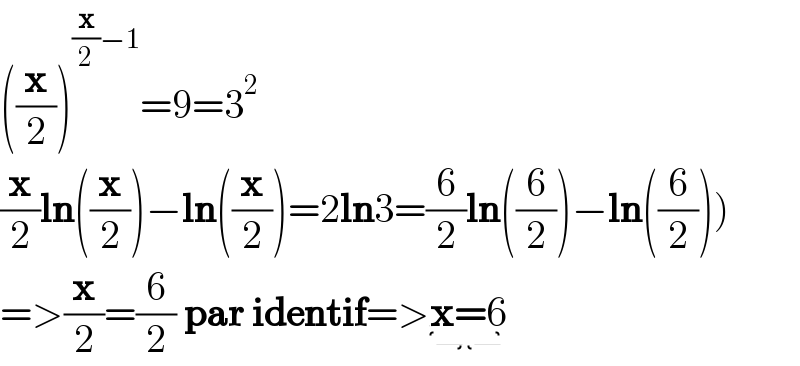
$$\left(\frac{\boldsymbol{\mathrm{x}}}{\mathrm{2}}\right)^{\frac{\boldsymbol{\mathrm{x}}}{\mathrm{2}}−\mathrm{1}} =\mathrm{9}=\mathrm{3}^{\mathrm{2}} \\ $$$$\left.\frac{\boldsymbol{\mathrm{x}}}{\mathrm{2}}\boldsymbol{\mathrm{ln}}\left(\frac{\boldsymbol{\mathrm{x}}}{\mathrm{2}}\right)−\boldsymbol{\mathrm{ln}}\left(\frac{\boldsymbol{\mathrm{x}}}{\mathrm{2}}\right)=\mathrm{2}\boldsymbol{\mathrm{ln}}\mathrm{3}=\frac{\mathrm{6}}{\mathrm{2}}\boldsymbol{\mathrm{ln}}\left(\frac{\mathrm{6}}{\mathrm{2}}\right)−\boldsymbol{\mathrm{ln}}\left(\frac{\mathrm{6}}{\mathrm{2}}\right)\right) \\ $$$$=>\frac{\boldsymbol{\mathrm{x}}}{\mathrm{2}}=\frac{\mathrm{6}}{\mathrm{2}}\:\boldsymbol{\mathrm{par}}\:\boldsymbol{\mathrm{identif}}=>\underbrace{ \boldsymbol{\mathrm{x}}=\mathrm{6}} \\ $$
